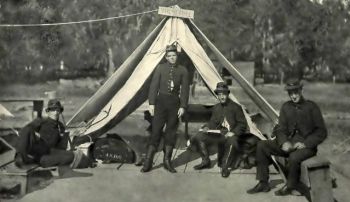The editor of the North Carolina Baptist Biblical Recorder, J. D. Hufham, continually casts about for news of revivals in the Confederate Army. This week an item from the North Carolina Christian Advocate, authored by a Confederate army missionary, is set before the Baptists of the Tar Heel State, raising the argument that the home front church has much to learn from the soldiers in the camps.
The Religious Question in the army is interesting to us all. I did not see a single careless look at divine service, nor did I hear a word of disrespect towards religion or its ministers; but I did see more devoutness than usual in congregations and a great desire to hear preaching. One evening I invited a captain to stand with me by a tree and sing a hymn. It was nearly dark.–When the hymn was finished I found that it had gathered nearly 200 men for prayer. We marched all day Sunday. At night several men gathered about a fire where I was, brought out a Bible and requested service. All knelt, officers and men. On Monday I had gone miles ahead to see the impressive sight of 134 wagons wind among the hills and ford a stream. Our orders were countermanded and I rode back to camp. Upon coming into Gen. Ramseur’s Brigade, I found he had sent two chaplains to call me to preach. Being allowed twenty minutes to sleep, I fell on the ground and was aroused to see such a congregation as few cities ever present. The General and staff and nearly every officer was present.–Among them were boys to whom I had preached at Chapel Hill, now noble men doing yeoman service for the country. At the close of my sermon I invited such as desired to strive after the life everlasting to come forward for prayer. More than twenty men stepped out and kneeled down. Afterwards several persons who made a profession of religion joined the Church. One evening I came upon Rev. Mr. Betts holding a prayer meeting and having a number of penitents, among them officers, sons of friends who had been my parishoners in North Carolina. At Gen. Iverson’s request I preached for his Brigade, officers uniting with the men as heretofore. In Gen. Daniel’s Brigade the congregation was immense, the attention strict, and the solemnity most impressive. Gen. Ramseur sent for me before I was up, on the morning of the Culpeper fight, to preach once more for his men, but before I was sufficiently rested we were in the line of march, the enemy having crossed and attacked Stuart’s cavalry.
I mention these facts to show that the officers and men are deeply feeling the need of divine grace. Oh! what an opening is in the army. Privates have come to me at night begging me to stay, and officers have almost insisted that I should not leave. If our pastors would take a month or two from their churches for destitute regiments, they would lay up treasures in heaven and carry a blessing back to their churches. The men in the army are exposed to peculiar temptations, but they are saved from peculiar temptations. They are not surfeited with meat or drink, they are out of the busy and absorbing rush of trade, the greed of gain is in obeyance. They have no business nor domestic cares. Their routine of duty leaves the mind free and the heart free to “receive with meekness the engrafted word.” Now is the time to press the truth of God upon their consciences.
The revival in the army differs in external indications from those at home. There is little noise, or sobbing, or even tears.–The men are deeply moved, but they are acting ever from principle. They march up to the cross as to serious, important duty. No sister or mother lays a fond hand on the soldier’s head, but Christ moves his heart before even he confesses him.
Why does the not the Church seek at this moment to join the army in a near approach to Christ?
Source: “Religion in the Army,” Biblical Recorder, June 24, 1863 (link)



